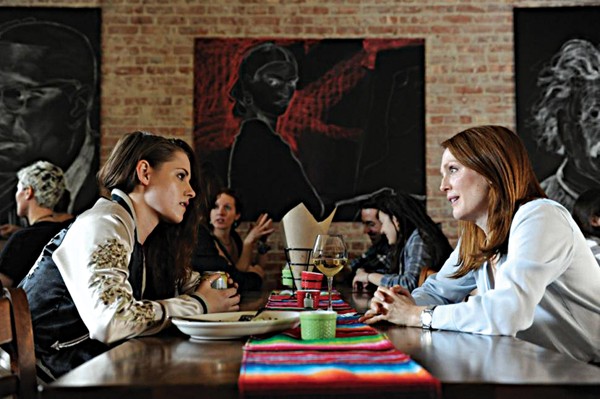Films are made for a lot of different reasons. Some films are “passion projects,” a director’s or producer’s personal vision; some films are made to play to a broad audience in the hopes of raking in money; and some films are personal showcases designed to highlight the talents of an individual performer. Usually, the end goal of the third type of project is to win its lead actor an Academy Award. Last year’s Philomena, for instance, was designed to get Judi Dench a Best Actress statue. It was a fine movie, but it failed in its primary mission when Dench lost out to Cate Blanchett.
This year’s entry into the Oscar-grab sweepstakes is Still Alice, starring Julianne Moore, whose wins at the Golden Globes and BAFTA cement her as the frontrunner for Best Actress. Moore plays Alice Howland, who is introduced at her 50th birthday party. Both she and her husband John (Alec Baldwin) are successful academics; she is the Lillian Young Professor of Linguistics at Columbia University, and he is a doctor at a research hospital. They have three children, but only two of them are at the intimate, elegant birthday dinner: Anna (Kate Bosworth), a newlywed trying to start a family; and Tom (Hunter Parrish), a college student. Lydia (Kristen Stewart) can’t make it because she is living the life of a struggling actress in Los Angeles.
Alice seemingly has it all: a great career, a solid marriage, and three kids who, even if they don’t always do what she says, at least seem to be doing okay. When Alice visits Los Angeles to speak at UCLA, she tries to convince Lydia to give up on her acting dreams and go to college to get a real job. But during her lecture in front of the brightest minds of her field, the first hints of trouble crop up when she finds herself at a rare loss for words. When she returns home, she goes for a run on the Columbia campus. But even though she knows the place like the back of her hand, she becomes momentarily disoriented.

Still Alice
Alice secretly visits her doctor, who refers her to Dr. Benjamin (Stephen Kunken), a neurologist who diagnoses her with a rare form of early onset Alzheimer’s Disease. Alice is determined to stay strong and keep her life on track, but the news gets worse. She has familial Alzheimer’s, passed down from her father’s side of the family, and her daughter Anna also has the gene.
The rest of the film chronicles Alice’s slow deterioration, and the effect it has on her family and friends. She starts to get bad evaluations from her students, and eventually has to resign from her teaching position. She starts to look for her own nursing-home options, but is spooked by what she sees. Directors Richard Glatzer and Wash Westmoreland keep the film’s point of view planted firmly in Alice’s world, shooting Moore with a shallow depth of field to blur out the background in a visual representation of her increasing confusion.
That Moore’s performance is fantastic should come as no surprise. She’s been good in so many different kinds of roles: Short Cuts, Boogie Nights, The Big Lebowski, The Hours, Children of Men — the list goes on. Her Alice is strong, smart, and self-controlled but brittle. When her brave face finally cracks in the second act, she goes down hard. But she gets back up again and keeps soldiering on. Such is Moore’s subtlety that we can watch whole internal conversations take place behind her eyes as her smile never changes.
Unfortunately, the rest of the film doesn’t rise to the level of Moore’s artistry. Baldwin in particular seems distracted by something off camera, giving the role about as much emotion as one of his commercial voice-over jobs. The script’s relentless downward arc is predictable, given the subject matter. Only Stewart seems to be as engaged as Moore. Lydia is completely believable as Alice’s daughter, and the scenes they have together, including a tricky walkie talkie down a flight of stairs that Aaron Sorkin would envy, are the best in the movie.
Moore’s performance is worthy of her Oscar-frontrunner status, and if Still Alice wins it for her, it will have fulfilled its mission. Unfortunately, it’s not good for much else.